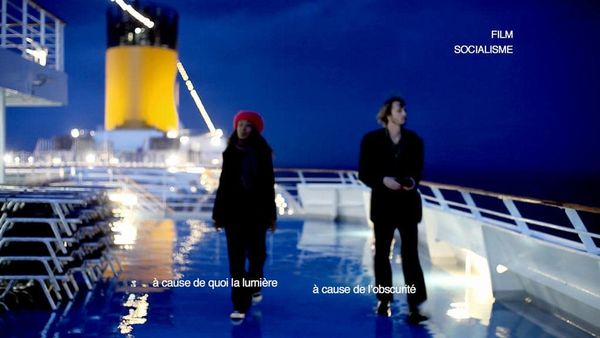Eye For Film >> Movies >> Film Socialisme (2010) Film Review
Film Socialisme
Reviewed by: Chris

I get quite excited at the prospect of a new Godard movie. Not that I see his work as any ultimate example. It’s strewn with faults. But somehow it is in a different milieu to most films you can watch. Like poetry, it’s not about the words, but the joy that comes from exploring, from original thought. Sound and vision used not to entertain but to seek a deeper level than can be expressed in prose or ‘narrative cinema as we know it.’
Yet the slew of bad reviews in this case prepared me for the worst. Perhaps age had caught up with the grand master of Nouvelle Vague. Or perhaps Godard was not beyond playing a joke on his audience, just to see what they made of it.

Omens were not great. The city’s main arthouse cinema had reserved a miserly total of three screenings in its smallest auditorium. There were no more than a dozen people there as I walked in. Some obviously by mistake, as they walked out halfway through. But I was already entranced. Wondering if I would be able to see it again in the final screening the next day. Looking forward to the DVD so I can stop-start for quotes that send my head spinning like I’m back in my alma mater’s philosophy class. A dizzying array of original and masterly techniques. And, like poetry, enough fluidity to offer meanings in ways that suit the individual viewer (persons who walked out excepted).
A warning: there is a ‘looking for answers’ but no real story. On a difficulty level, this film is much harder than Breathless, Le Mepris, or Vivre Sa Vie. It is warmer and more captivating than Weekend or Made In USA, but only just. It lacks the clear expository style of his last most recent well-known movie, Notre Musique. It has three main sections: 1 - scenes on a Mediterranean cruise ship (Things), 2 - a European family (Our Europe), and 3 - scenes of conflict and war (Humanities). Each seeks understanding to certain questions on an individual, interpersonal and political level.
The first section held my attention the most. Inside the cruise ship is a plethora of ‘things’ (if this was Godard of yesteryear, I’d maybe have written ‘bourgeois distractions.’) Only when we go outside, or see the light shine in, do we experience crisp photography, scenes of genuine beauty, and people spending their time at least trying to solve some of life’s deeper puzzles. Perhaps this is just my own interpretation, but I like the way it is depicted visually. Money is a ‘common good’ – like water – but party-people on board use it for nothing but bloated consumerism. Meaningless dance classes and revelry. As two people engage in philosophical discourse outside the main hall, a woman repeatedly falls against the glass partition. Is she dancing and letting her spirit free? Apparently not – she falls face down into the swimming pool.
There is a young girl seen frequently with an old man. Something strange there? A hooker perhaps? Or maybe a scholar or seeker of truth – availing herself of the rich variety of elderly experience onboard (a philosopher, a UN bureaucrat, a Palestinian ambassador, and so on).
Characteristic Godardian effects are used with casual precision. There is no attempt at reality if it stands in the way of the point he is making. Such as when the background noise cuts out momentarily for the word ‘happiness’ to occur in the girl’s dialogue. Deliberate camera distortions emphasise the alcohol-sodden mentality of the majority of passengers, images often obscenely blurred as if taken on a mobile phone. Or the mother in Section Two who talks to the camera about how she is totally unaware of the part she is playing.
There are more hidden references than in an afternoon of Tarantino movies. Except, unlike Tarantino, Godard is not entertaining pub quiz movie geeks; but giving clues to further meanings within his experimental and exploratory work. A young lad gives a young woman a copy of La Porte Entroite (a coming of age novel). There are nods to Husserl’s philosophical geometry which fit the film but will need hours of study to fully appreciate (we see a projection of a man lecturing on ‘geometry as origin’ – to an empty auditorium). And Balzac’s Illusions Perdues, which anticipates themes of aristocracy vs poverty as well as journalism as intellectual prostitution. And don’t miss the homage later to Battleship Potemkin’s Odessa Staircase slaughter.
The dialogue sparkles from witty – “The United Nations have been somewhat disunited since 1948,” to surreal and Zen-like – “Once in 1942 I have encountered nothingness...” (I’m quoting from memory and leaving the end of the quote for you to enjoy onscreen.)
The individual’s relation to government is addressed by the adolescents in the second Section, positing a difference between the State and Society. The dream of the State is to be ‘one’; whereas the dream of the Individual is to be two, to ‘pair up.’ Aggressively intrusive foreigners demanding driving directions are given a cold shoulder (“Go and invade some other country!”) An intrusive camera, making a documentary about a coming election, similarly distances everyone from any (inner) reality.
Some of the phrases from Section Two bleed over into scenes of Section Three bloodshed. The young girl wants people to, “learn to see before learning to read.” Godard’s intertitles come fast and frequent, and in many different languages. At one point, a prayer in Hebrew and a prayer in Arabic are overlaid, visually and aurally. It recalls Godard’s offhand response to the question, “Peace In the Middle East - when?” by replying, “As soon as Israel and Palestine introduce six million dogs and stroll with them as neighbours who don’t speak, who don’t speak of something else.”
Cinema can sometimes provide a remarkable opportunity to communicate without speaking those things which are often too difficult, or too sensitive, or simply whitewashed of their core by aimless chatter. Or by narrative movies.
Reviewed on: 04 Aug 2011
















